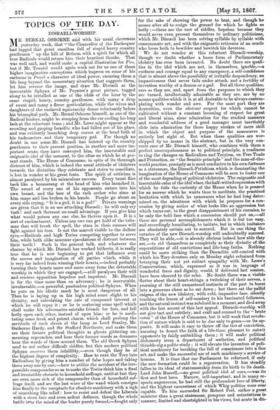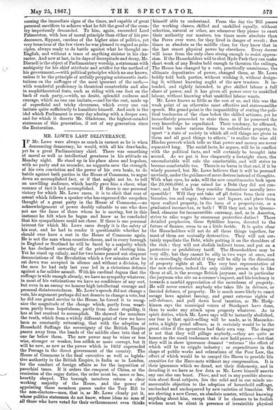TOPICS OF THE DAY.
DISRAELLWORSHIP.
MR. BERNAL OSBORNE said with his usual cleverness yesterday week, that "the Chancellor of the Exchequer had lugged that great omnibus full of stupid heavy country gentlemen" up the hill of Reform with a spirit for which all true Radicals would return him their heartiest thanks. That was well said, and would make a capital illustration for Fun, but if Mr. Tenniel would again work out for us one of those higher imaginative conceptions which impress on some of his cartoons in Punch a character of ideal power, ensuring them a life long beyond the momentary situation that suggests them, let him reverse the image, and draw Mr. Disraeli as the inscrutable Sphynx of Mr. Poynter's great picture, tugged along to be installed as one of the idols of the hour by the same stupid, heavy, country gentlemen, with many a drop of sweat and many a fierce gesticulation, while the wives and daughters of the enslaved squirearchy dance reluctantly before his triumphal path. Mr. Bernal Osborne himself, as one of the Radical leaders, might be stooping from the car curling his long lash at the reluctant team ; and Mr. Lowe might appear as the scowling and gasping Israelite who had fallen out of his place, and was evidently launching deep curses at the head both of his taskmasters and their temporary god. For though no doubt in one sense Mr. Disraeli has hoisted up the country gentlemen to their present position, in another and more im- portant sense, they have convoyed him, the inscrutable and enigmatic idol of the moment, to the 'altar on which he at pre- sent stands.. The House of Commons, in spite of its thorough distrust of him, which is indeed the usual attitude of idolaters towards the divinities they celebrate and strive to conciliate, is lost in wonder at his great feats. The spirit of criticism is almost paralyzed by his miraculous success. Every taunt flies back like a boomerang at the head of him who launched it. The sword of every one of his opponents enters into his own breast, and the bow of the rash archer who aims at him snaps and lies broken in his hands. People go about on every side crying, "it is a god, it is a god!" Private warnings are given that it is no use attacking Disraeli ; he will only cry tush ! and suck thereout no small advantage. If you give him what would poison any one else, he thrives upon it. It is a sort of enchantment. Unless any one can get hold of the talis- man that will break the spell, the stars in their courses will fight against his foes. Is not the marvel visible to the dullest eyes,—Radicals and high Tories competing together to serve him, while both alike murmur ejaculations of distrust between their teeth ? Such is the general talk, and whatever the charms by which Mr. Disraeli has worked hitherto, it is really true that he is now beginning to get that influence over the nerves and imagination of all parties which, while it is very far indeed from winning their hearts,—indeed probably turning their hearts more and more away from the detestable worship in which they are engaged,—still paralyzes their will and renders opposition hopeless and impotent. Mr. Disraeli is for the time more than an adversary ; he is inscrutable, invulnerable,—a powerful, passionless political Sphynx. When he puts on his idiotic mask he is most dangerous of all. Then he is laying up in his high mind some slight to his divinity, and calculating the rate of compound interest at which he will repay it ; or he is maturing some spell which shall make his adversaries mistake friends for foes, and fall hotly upon each other, instead of upon him; or he is medi- tating some fresh and potent charm, which shall prolong the servitude of such slaves of the lamp as Lord Stanley, Mr. Gathorne Hardy, and Sir Stafford Northcote, and make them see their former political thoughts as ghosts gibbering un- meaning reproaches, and hear their former words as dreamers hear the words of those around them. The old Greek Sphynx used to tisk rather difficult riddles,. but this modern political Sphynx answers them infallibly,—even though they be of the highest degree of complexity. How to coax the Tory into Radicalism by giving him a number of false hopes and taking them away one by one ;—how to utilize the accident of the irre- pressible compounder so as to make the Tories think him a final and irresistible obstacle to household suffrage, until at last they are even more sick of the compounder than of household suf- frage itself, and see the last wave of the wand which consigns him finally to the receptacle for obsolete machinery with a sigh of something like relief ; how to resist and defeat the Liberals with a stern face and even ardent defiance, though the whole battle isito the mind of the leader purely formal,—fought only for the sake of showing the power to beat, and though he means after all to resign the ground for which he fights so hotly ; —these are the sort of riddles, hopeless because they would never even present themselves to ordinary politicians, which Mr. Disraeli has been solving syllable by syllable with consummate art, and with the enigmatic reticence of an oracle who loves both to bewilder and bewitch his devotees.
We do not wonder at this reluctant Disraeli-worship, though we doubt whether a baser form of Parliamentary idolatry has ever been invented. No doubt there are quali- ties in the idol which are not, in themselves, ignoble,—a coolness and courage equal to any emergency, a self-confidence that is almost above the possibility of irritable despondency, an impassiveness that never fails under attack, and a fertility of invention worthy of a demon or a god. But all these qualities, rare as they are, and, apart from the purposes to which they are turned, intellectually admirable as they are, are by no means qualities which it is at all desirable to be always contem- plating with wonder and awe. For the most part they are dexterities, even the abstract respect for which cannot be cultivated without a constant lessening of respect for great and liberal aims, since admiration for the studied manners and wonderful address of a good manager must inevitably slide into admiration for those happy strokes of mere skill in which the object and purpose of the manceuvre is entirely lost sight of. But when these qualities are wor- shipped by no means in the abstract, but in the very con- crete case of Mr. Disraeli himself, who combines with them a perfect unscrupulousness as to political principle, a readiness to ring the changes on Radicalism and Toryism, on Free Trade and Protection, on "the Semitic principle" and the man-of-the- world practice, precisely as is most conducive to his own fortunes as a statesman, the Disraeli-Fetishism which is dominating the imagination of the House of Commons will be seen to foster one of the most degrading of political idolatries. The enigmatic and inscrutable calm of the idol's face, thehalf-witted expression with which he foils the curiosity of the House when he is pressed for an answer which he wants time to meditate, the practised hesitation with which he announces what he had long deter- mined on, the adroitness with which he prepares for a con- cession by giving notice of what looks like an aggression but which turns out, to the great disappointment of his enemies, to be only the bold face which a concession should put on,—all these are personal accomplishments which it is but too easy, and exceedingly humiliating, to imitate, but in which imitators are absolutely certain not to succeed. But in one thing the votaries of the new Disraeli-worship will undoubtedly succeed. They will be able,—it is already obvious indeed how able they are,—to rid themselves as completely as their divinity of the superstitions of old convictions and life-long faiths. Nothing could be more striking than the Disraelite self-control with which his Tory devotees only on Monday night refrained from betraying their not yet extinct sympathy with Mr. Lowe's Conservatism, which, expressed as it was in language of wonderful force and dignity, would, if delivered last session, have been cheered to the echo. No doubt there was a visible flutter about their heart-strings, a twitching of their nerves, a yearning of the still unmastered instincts of the past to burst into a generous cheer as he sat down ; but there sat the pallid enigma of the new idolatry, with cold, impassive face, silently teaching the lesson of self-mastery to his fascinated followers, and the natural instinct was subdued in a moment, and died away with the last accent of this last appeal. Disraeli-worship will not give tact and subtlety, and craft and counsel to the "brute votes" of the House of Commons, but it will work that revolu- tion of nature which is said to be due only to grace—or its op- posite. It will make it easy to throw off the ties of conviction, amusing to desert the faith of a life-time, pleasant to outwit opponents by fairly outbidding them ; it will make political dishonesty seem a department of msthetics, and political thimble-rig a polite study ; it will elevate the invention of poli- tical machinery for breaking the fall of consciences into a fine art, and make the successful use of such machinery a seryice of honour. It is time that our Parliament be reformed, if only the new formation could be a regeneration. It has steadily fallen in its ideal of statesmanship from its birth to its death. Lord John Russell,—no great political idol of ours,—was its first and best hero. Narrow, self-important, and in many re- spects ungenerous, he had still the profoundest love of liberty, and the highest earnestness of which Whig politics were ever capable. To him succeeded Sir Robert Peel, rather a great minister than a great statesman, pompous and ostentatious in manner, limited and shortsighted in his views, but acute in din-
cerning the immediate signs of the times, and capable of great personal sacrifices to achieve what he felt the good of the coun- try imperiously demanded. To him, again, succeeded Lord Palmerston, with less of moral principle than either of his pre- decessors, flippant, careless of the higher aims of politics, yet very tenacious of the few views he was pleased to regard as prin- ciples, always ready to do battle against what he thought us- English, and without a trace of anything sinister in his cha- racter. And now at last, in its days of decrepitude and decay, Mr. Disraeli is the object of Parliamentary worship, a statesman with ambiguity for his chief attribute and artifice for the method of his government,—with political principles which no one knows, unless it be the principle of artfully propping aristocratic insti- tutions on the suffrages of the most ignorant of the mob,— with wonderful proficiency in theatrical counterfeits and also in amphitheatical feats, such as riding with one foot on the back of each party,—with, no doubt, splendid coolness and courage, which no one can imitate,—and for the rest, made up of superficial and tricky cleverness, which every one can imitate quite sufficiently to humiliate himself. And such is the idol which Parliament is every day adoring with a deeper awe, and for which it deserts Mr. Gladstone, the highest-minded statesman of this generation, if not of any generation since the Restoration.































 Previous page
Previous page